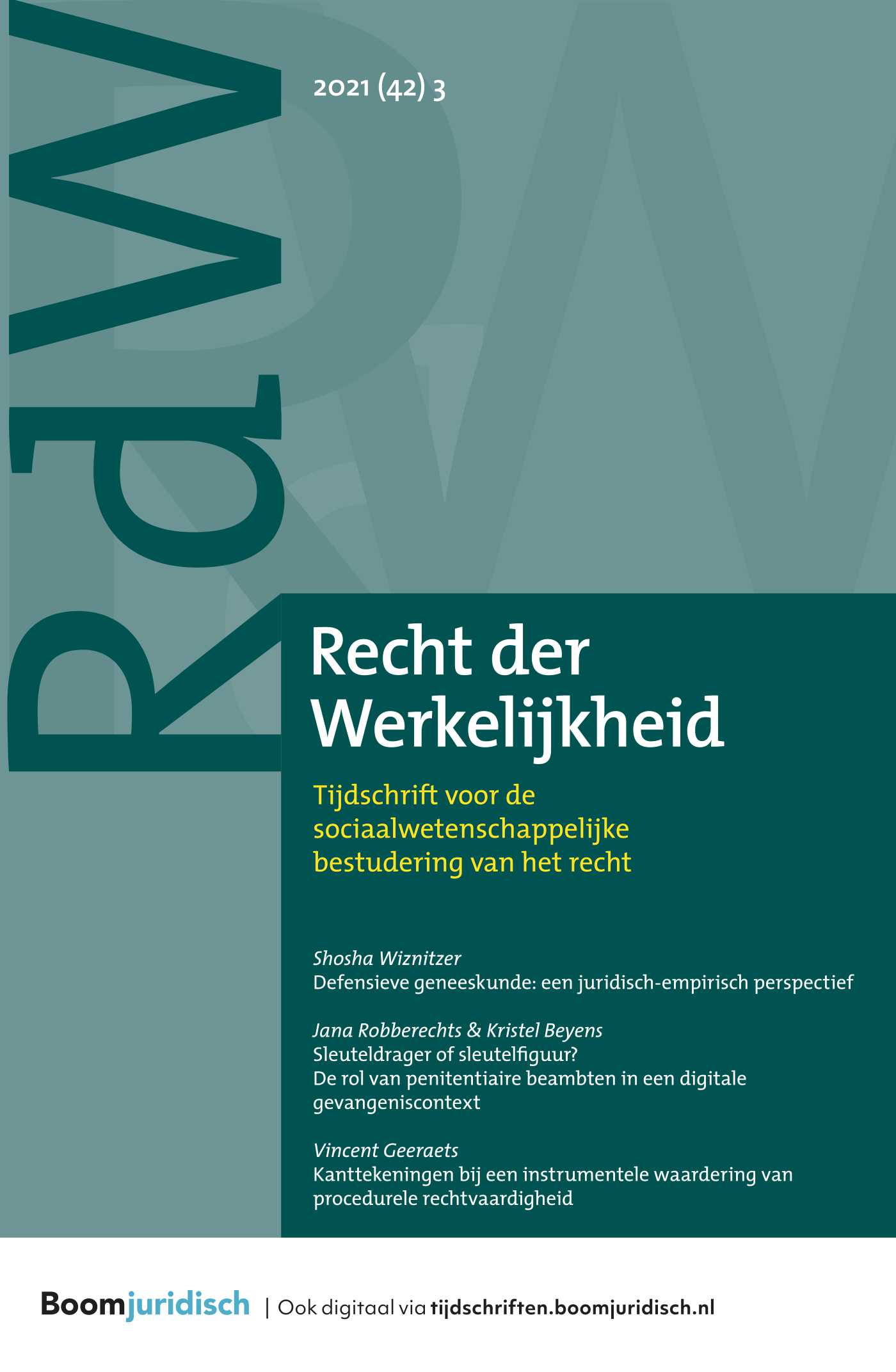|
Empirical Legal Research (ELS) often includes the experience of legal experts or participants with a non-vulnerable position or high socio-economic status. However, the experience of vulnerable participants, such as participants with a low socio-economic status or participants with reading and writing difficulties, is often missing. These participants can therefore be considered underrepresented in ELS. Based on literature and interviews conducted as part of my PhD research, this paper presents five best practices on how underrepresented participants can be included in ELS in the future. |


Recht der Werkelijkheid
Meer op het gebied van Algemeen
Over dit tijdschriftMeld u zich hier aan voor de attendering op dit tijdschrift zodat u direct een mail ontvangt als er een nieuw digitaal nummer is verschenen en u de artikelen online kunt lezen.
| Redactioneel |
Voorbij de barrières in ELS en op zoek naar de verbinding |
| Trefwoorden | ELS, Barrières in onderzoek, Normativiteit, Methodologie, Empirisch-juridisch onderzoek |
| Auteurs | Tasniem Anwar, Anna Goldberg en Anna Pivaty |
| Auteursinformatie |
| Essay |
|
| Trefwoorden | Empirical Legal Research (ELS), Methodology, Underrepresented participants, Best practices, Qualitative research |
| Auteurs | Anne Janssen |
| SamenvattingAuteursinformatie |
| Essay |
Quasi-etnografisch (archief)onderzoek als empirisch-juridische methode |
| Trefwoorden | Empirical legal studies, Etnografie, Epistemologie, Constructivisme, Wetenschapsfilosofie |
| Auteurs | Keri van Douwen |
| SamenvattingAuteursinformatie |
|
By now, Empirical Legal Studies has established itself as a distinct academic field within Dutch universities, encompassing both qualitative and quantitative studies. Moving on from a debate purely about methods, this essay argues that more attention should be given to the epistemological and ontological beliefs that inform ELS research. Explicitly considering beliefs about what constitutes legitimate knowledge and how knowledge can be gained clarifies that methodologically empirical (legal) research can be based in distinct scientific paradigms. While ELS has developed mostly on the basis of an objectivist epistemology and a realist ontology, this essay demonstrates the significance of being inclusive of research informed by other understandings of knowledge and knowledge production. After briefly introducing such different scientific paradigms, the essay turns to a concrete example of empirical legal research that applies an interpretivist empirical method: quasi-ethnography. |
| Essay |
Wat is kritisch empirisch-juridisch onderzoek? |
| Trefwoorden | Empirical Legal Studies, Empirisch-juridisch onderzoek, Kritisch onderzoek, Poststructuralisme, Foucault |
| Auteurs | Anja Eleveld |
| SamenvattingAuteursinformatie |
|
The injustice that resulted from the implementation of the child care benefit in the Netherlands could continue for years without sufficiently considering the voices of the victims of the harsh action by the tax authorities. In this essay, it is argued that critical empirical legal research in which we dare to question our own truths can make an important contribution to preventing or timely countering excesses such as this. I outline the contours of a research methodology for critical empirical legal research, which is based on a post-structuralist ontology and epistemology. |
| Essay |
Geen kloof maar contextNaar een herijking van het rechtsbegrip in ELS-onderzoek |
| Trefwoorden | Empirical Legal Studies, law in books and law in action, normative language analysis, H.L.A. Hart, Sally F. Moore |
| Auteurs | Jeroen Kiewiet |
| SamenvattingAuteursinformatie |
|
This article examines the basic assumption underlying some examples of Empirical Legal Studies, that there is a gap between ‘law in books’ and ‘law in action’. This article criticizes these ‘gap’-studies. Despite the importance of empirical knowledge to the assumptions and the effects of law, the ‘gap’-approach fails to incorporate the social context of law. The omission of the social context is based on a legal centralist approach to law and overlooks the dimension of normativity of law. This essay proposes to abandon a legal centralist ‘gap’-approach and to embrace a contextual approach. This contextual approach is based on normative language analysis, which finds its roots in H.L.A. Hart’s The Concept of Law. In the anthropological literature, the work of Sally F. Moore stands out as an inspiring example of a contextual analysis that showcases the importance of a focus on normative language. The step towards a careful analysis of normative language would only strengthen ELS research. This can, however, only be achieved by abandoning the ‘gap’-approach. |
| Essay |
Empirisch-juridisch onderzoek op waarde geschat?Een pleidooi voor kruisbestuiving binnen de rechtswetenschap |
| Trefwoorden | empirical legal research, Interdisciplinarity, law as a discipline, research methodology, fact/value distinction |
| Auteurs | Thomas Riesthuis |
| SamenvattingAuteursinformatie |
|
In recent years, empirical legal research has been criticized by Dutch legal scholars. These critics maintain that empirical legal research delegitimizes other types of legal scholarship and that empirical legal research cannot account for the normative character of legal scholarship. In this paper, it is argued that this critique is unwarranted. Empirical legal research does not delegitimize other types of legal scholarship. And empirical legal research does not need to adhere to a fact/value dichotomy. Moreover, this paper explores how empirical legal research may enrich other types of legal scholarship. |
| Verslag |
Verbinding zoeken in het methodendebatVerslag van het symposium over normativiteit in empirisch-juridisch onderzoek |
| Auteurs | Freya Augusteijn, Cheyenne Dunk en Rick Maas |
| Auteursinformatie |

